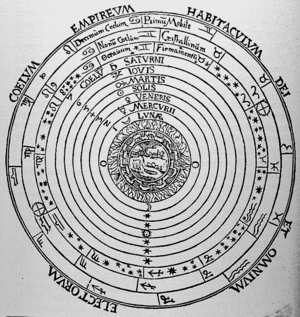Faust: Night (1): Difference between revisions
| Line 19: | Line 19: | ||
4. What reason does Faust offer the spirit as to why he called it? | 4. What reason does Faust offer the spirit as to why he called it? | ||
5. How does | 5. How does Wagner feel about the knowledge he seeks? | ||
6. How does Faust feel about the ideas Wagner expresses? | 6. How does Faust feel about the ideas Wagner expresses? | ||
Revision as of 10:31, 27 February 2006
Summary
Faust languishes in his study in a state of ennui. He has studied it all, received every degree, and still feels he knows nothing. All of this effort has lost him his "mirth" (l. 134). He has now turned to "magic" to do what science and philosophy could not. Faust figures by using magic he will be able to learn beyond what humans understand. He then conjures up a spirit that rejects him and brings Faust into a worse mood. "It's your idea of me your equal to, Not me!" (l. 283) Wagner then comes in and talks to Faust. They talk briefly and then Wagner departs to leave Faust alone. While Faust is alone he talks more about the spirit that rejected him and talks himself into a more depressed mood. Faust then pulls down a vial of poison and when he just about drinks his life away a choir of angels begins singing. He then thinks back when he was young and happy. This makes him not drink the poison. "Tears fill my eyes, earth claims me again!" (l. 560)
Notes
Nostradamus
"And this strange book of secret lore by Nostradamus' own hand..." (l. 190). Faust here is talking about reading one of the book of quatrains(a poem with four lines) written by Nostradamus. Nostradamus lived from 1503 to 1566. He recieved a bachelors degree and a license to practice medicine at the age of nineteen. Nostradamus later studied alchemy and the works of magic. He was known as a good healer during the plague. Although Nostradamus was best known for his writings, The Centuries. He wrote ten of these that each contained one hundred quatrains. The books held prophecies that covered almost two thousand years.
Commentary
Study Questions
1. Why does Faust feel as though he must turn to the occult?
2. Explain why this is more likely to appear in a text written during the period of Romanticism than during the age of Enlightenment?
3. How does the spirit feel about being summoned by Faust?
4. What reason does Faust offer the spirit as to why he called it?
5. How does Wagner feel about the knowledge he seeks?
6. How does Faust feel about the ideas Wagner expresses?
7. What advice is offered by Faust to Wagner?
8. How does the Faust’s encounter with the spirit, aid in his decision to commit suicide?
9. What stops Faust from drinking the poison?
10. What is the significance of the line ‘certain assurance of a new covenant” (523)?
External Resources
Works Cited
< Prologue in Heaven | Faust Summary, Commentary, Notes | Outside the City Gate >

